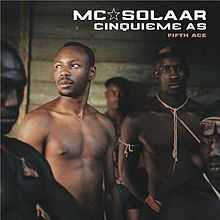Cinquième As
| Cinquième As | ||||
|---|---|---|---|---|
 | ||||
| Studio album by MC Solaar | ||||
| Released | 2001 | |||
| Recorded | 2001 | |||
| Genre | Rap | |||
| Length | 65:22 | |||
| Label |
Wea International Elektra | |||
| Producer |
Eric K-Roz and Alain J of The Black Rose Corporation DJ Sample DJ Mac DJ Pep | |||
| MC Solaar chronology | ||||
| ||||
| Professional ratings | |
|---|---|
| Review scores | |
| Source | Rating |
| Allmusic | |
Cinquième As was the fifth studio album by MC Solaar released in 2001. It is slightly different than his previous works because of a stronger emphasis on a string background.[2] The album gained exposure in the United States after "La Belle et le Bad Boy" was played on an episode of Sex and the City. Musically, the album features more R&B themes featuring a layering of a female voice on a few tracks, and it is especially notable and true to the MC Solaar character which is strong emotion expressed in the delivery and lyrics.[3] The album pays tribute to where he grew up, Senegal. He uses the album to condemn the role of the World Bank in developing nations. This is most apparent on the track "Les Colonies," where the lyrics state, "Dans cette ère de négoce où ne vivent que les big boss/ Rentabilité - instabilité - imbécillité/ N'ont fait qu'augmenter les taux de mortalité," meaning, "In this era of trade where only the big bosses live/ Profitability - instability - imbecility/ Have done nothing but increase rates of mortality," referring to policies of the International Monetary Fund and World Bank.
MC Solaar also discusses the condition of African immigrants in France. He himself migrated with his family to the banlieues of Paris as a teenager, and he talks about this experience in the song "Leve-toi et rap". MC Solaar's message is seen throughout the lyrics and the visual design of the album. The album cover is a picture of a group of men, including the artist himself, all naked from the waist up, as if trying to convey an image of slaves about to embark on a slave ship. However, upon taking a closer look, it appears that the men are African wrestlers. The theme of wrestling and fighters pays homage to the African presence in France.[4]
Track listing
- Introdiction – 1:53
- "Solaar Pleure" – 4:57
- "Lève-Toi et Rap" – 3:29
- "Les Colonies" – 4:01
- "Hasta la vista mi amor!" (intro) – 0:15
- "Hasta la vista mi amor!" – 3:23
- "La Belle et le Bad Boy" – 3:12
- "La La La, La" – 3:51
- "Arkansas" – 1:39
- "Baby Love" – 4:07
- "Dégâts collatéraux" – 4:00
- "RMI" – 4:19
- "C'est ça que les gens veulent" (feat. 9respect) – 4:05
- "L'aigle ne chasse pas les mouches" – 3:12
- "Hiphopaloorap" (feat. Don Xeré Delavega) – 1:45
- "Le Cinquième As" – 3:48
- "Playmate" – 3:02
- "L'homme qui voulait 3 milliards" (feat. Bambi Cruz) – 3:03
- "Si je meurs ce soir" (feat. Black Jack) – 3:59
- "Samedi Soir" (hidden track) – 2:21
External links
References
- ↑ Allmusic review
- ↑ Album Review
- ↑ French rapper's new CD a bit mainstream - Features
- ↑ Helenon, Veronique. “Africa on Their Mind: Rap, Blackness, and Citizenship in France.” In The Vinyl Ain’t Final: Hip Hop and the Globalization of Black Popular Culture, ed. by Dipannita Basu and Sidney J. Lemelle, 151-66. London; Ann Arbor, MI: Pluto Pres
| ||||||||